The Oldest Ancestor Of Modern Birds Has Been Found In China


The Oldest Ancestor of Modern Birds Has Been Found in China
Ever since the birdlike dinosaur Archaeopteryx was first discovered in 1861, paleontologists have tried to decipher the evolutionary origins of modern birds—the only surviving descendants of the dinosaurs.
Now, paleontologists based out of the Chinese Academy of Sciences (CAS) have reached a new milestone in this quest. The CAS team has discovered the oldest fossils from the Ornithuromorpha group of dinosaurs, the common ancestor of all modern bird species.
The two specimens date back 130 million years to the Early Cretaceous period, when pterosaurs still dominated the skies. They belong to a new species named Archaeornithura meemannae, a feathered wading bird that lived in what is now northeastern China. The CAS team, led by paleontologist Min Wang, published a detailed analysis of the new specimens today in Nature Communications.
Continue Reading.
More Posts from The-sleepy-chemist and Others
My favorite thing from this year: playing with the glowstick reaction using TCPO (bis(2,4,6-trichlorophenyl) oxalate).
The glow stick contains two chemicals and a suitable dye. One of the chemicals is a diaryl oxalate (in this case TCPO, or bis(2,4,6-trichlorophenyl) oxalate), the other one is an oxidizer, usually hydrogen peroxide. By mixing the peroxide with the oxalate ester, a chemical reaction takes place, releasing energy that excites the dye, which then relaxes by releasing a photon, emitting light. The color of the emitted light depends on the structure of the dye.
Using Nile Red:
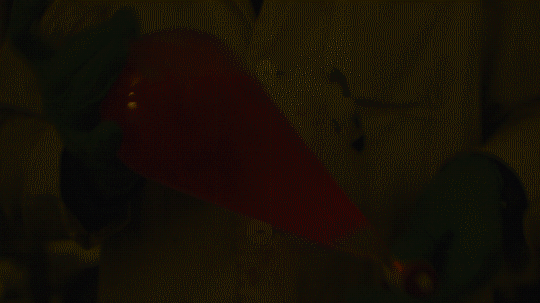
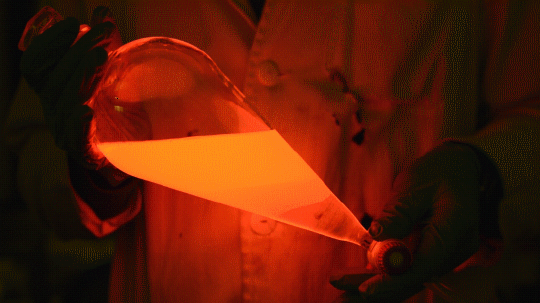
Mixing it with Perylene:

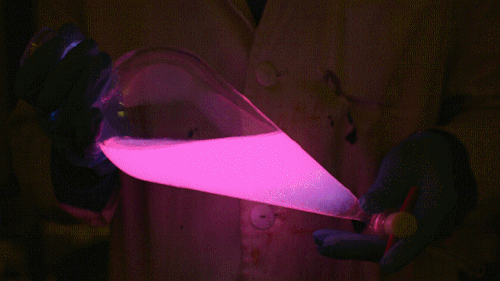
During this reaction I used two type of dyes, on of them was Nile Red, what is a quite special, solvatofluorescent dye and Perylene what is a polyaromatic hydrocarbon. When used in pure form the perylene emits a bright blue light, but when its combined with Nile Red, it emits this nice pinkish-purple as seen on the gifs above and on the video.
Mammals both produce milk and have hair. Ergo, a coconut is a mammal.
maybe if im under enough blankets, the Responsibilities wont be able to find me

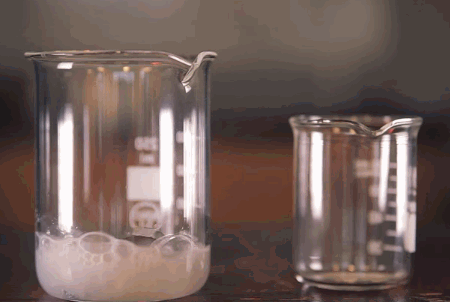
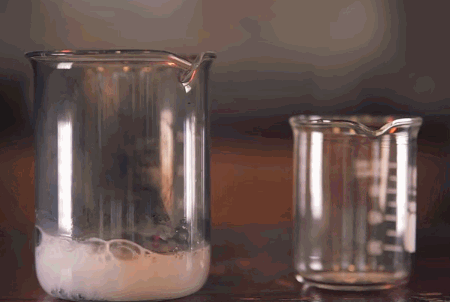
Calcium Carbide: Playing with Acetylene flames
Calcium carbide is a chemical compound with the chemical formula of CaC2. Its main use industrially is in the production of acetylene and calcium cyanamide.
The pure material is colorless, however pieces of technical-grade calcium carbide are grey or brown and consist of about 80–85% of CaC2 (the rest is CaO (calcium oxide), Ca3P2 (calcium phosphide), CaS (calcium sulfide), Ca3N2 (calcium nitride), SiC (silicon carbide), etc.). In the presence of trace moisture, technical-grade calcium carbide emits an unpleasant odor reminiscent of garlic.
Applications of calcium carbide include manufacture of acetylene gas, and for generation of acetylene in carbide lamps, manufacture of chemicals for fertilizer; and in steelmaking.
The reaction of calcium carbide with water, producing acetylene and calcium hydroxide, was discovered by Friedrich Wöhler in 1862.
Reaction with Water:
CaC2+ 2 H2O → C2H2+ Ca(OH)2
possible incomplete combustion occurring:
3C2H2 + 4O2 →2C + 3CO + CO2 + 3H2O
Giffed by: rudescience From: This video
20 THINGS YOU SHOULD DO EVERYDAY 1. Wake up earlier. Not only does this improve productivity but it also gives you more time to make a good, hearty breakfast. 2. Make your bed. Let’s be real, being welcomed to a tidy bed after a long day at work/school (or a long day in general) is probably the best feeling anyone will ever experience. 3. If you want, spend a little more time on your appearance. Take some time choosing an outfit, applying make up or whatever. Do what helps you boost your confidence and self-esteem. 4. Stay hydrated, folks. Keep a bottle of water with you wherever you go. 5. Stretch everyday or start yoga (or do both, why not?) 6. Create a playlist consisting of songs that make you happy and listen to it. Listen to songs for the mood you want to be in, instead of the mood you are in. 7. Compliment at least one person per day. This could be an acquaintance, co-worker, class mate, stranger, whoever! 8. Use your manners. If someone holds the door for you, lets you go first etc, they did it voluntarily and didn’t have to do it, so a “thank you” wouldn’t hurt. 9. Eat your fruit and vegetables and always choose the healthy version over the junk food. 10. Have a good laugh. Catch up with friends, watch some ‘Parks and Recreation’, go see some stand-up comedy, reminisce about funny moments that have happened to you. You don’t need to be a doctor to know that humour has many benefits. 11. Be optimistic. Always look at the positives. There’s no point on focusing on the negatives because that isn’t going to help anyones mood at all. 12. Exercise. It doesn’t have to be anything to intense. A run around the block, a walk with your dog or even a ‘Just Dance’ session will do the job. 13.Bring a book/magazine or collect the daily newspaper with you. Spend you spare time reading. 14. Try and learn something new everyday. This can either be an interesting fact you saw online or a new skill someone taught you. 15. Help others when you are able to. Help your classmates with school work or offer to help you struggling neighbour lift those heavy objects. 16. Stop procrastinating. No matter how unmotivated you are to, push yourself and complete what you need to complete. Do what you gotta do. You know you’ll love yourself for doing it. 17. Drink some tea, because that stuff is goooooood (and also beneficial). 18.Make time to do things that help you relax, whether that’s painting, having baths, doing you nails or going for a run. 19. Don’t dwell on your mistakes, but instead grow and learn from them. 20. And lastly, be kind to yourself. If you love who you are, everyone else will
Chloe for Native Moon Magazine (via nativemoonmag)
Roses are red Your titriant is pink You failed Go throw your diploma in the sink
Roses are redYour titrant is pinkYou’re not within 2% of the actual valueYou automatically drop a full letter grade on this assignment because achem is a bitch

This week is Antibiotic Awareness Week – learn more about the different types of antibiotics with this graphic!




Cyanea capillata by Alexander Semenov

Viscosity can have a notable effect on droplet impacts. This poster demonstrates with snapshots from three droplet impacts. The blue drops are dyed water, and the red ones are a more viscous water-glycerol mixture. When the two water droplets impact, a skirt forms between them, then spreads outward into a sheet with a thicker, uneven rim before retracting. The second row shows a water droplet impacting a water-glycerol droplet. The less viscous water droplet deforms faster, wrapping around and mixing into the other drop before rebounding in a jet. The last row switches the impacts, with the more viscous drop falling onto the water. As in the previous case, the water deforms faster than the water-glycerol. The two mix during spreading and rebound slower. In the last timestep shown, the droplet is still contracting, but it does rebound as a jet thereafter. (Image credit: T. Fanning et al.)

-
 zoonomist liked this · 7 years ago
zoonomist liked this · 7 years ago -
 scubbl3-blog liked this · 9 years ago
scubbl3-blog liked this · 9 years ago -
 mattalf liked this · 9 years ago
mattalf liked this · 9 years ago -
 reakka reblogged this · 9 years ago
reakka reblogged this · 9 years ago -
 amymartiny liked this · 9 years ago
amymartiny liked this · 9 years ago -
 oldoddandowly reblogged this · 9 years ago
oldoddandowly reblogged this · 9 years ago -
 supersladewilson reblogged this · 9 years ago
supersladewilson reblogged this · 9 years ago -
 cupofsorrows reblogged this · 9 years ago
cupofsorrows reblogged this · 9 years ago -
 what-a-daringdream-blog reblogged this · 9 years ago
what-a-daringdream-blog reblogged this · 9 years ago -
 lovelyerror liked this · 9 years ago
lovelyerror liked this · 9 years ago -
 ultra-moomeow liked this · 9 years ago
ultra-moomeow liked this · 9 years ago -
 lpsgal10 liked this · 9 years ago
lpsgal10 liked this · 9 years ago -
 mimakirigoe liked this · 10 years ago
mimakirigoe liked this · 10 years ago -
 hexed-dream reblogged this · 10 years ago
hexed-dream reblogged this · 10 years ago -
 etosforfuturereference reblogged this · 10 years ago
etosforfuturereference reblogged this · 10 years ago -
 tatooine-jedi liked this · 10 years ago
tatooine-jedi liked this · 10 years ago -
 pokefan5000-blog liked this · 10 years ago
pokefan5000-blog liked this · 10 years ago -
 guttergremlin liked this · 10 years ago
guttergremlin liked this · 10 years ago -
 ailurophileness liked this · 10 years ago
ailurophileness liked this · 10 years ago -
 thatfuhkinhippie reblogged this · 10 years ago
thatfuhkinhippie reblogged this · 10 years ago -
 stephy--love liked this · 10 years ago
stephy--love liked this · 10 years ago -
 awesomesauceisbestsauce liked this · 10 years ago
awesomesauceisbestsauce liked this · 10 years ago -
 esteva-o liked this · 10 years ago
esteva-o liked this · 10 years ago -
 flowerew-calseta43 liked this · 10 years ago
flowerew-calseta43 liked this · 10 years ago -
 tennyo-elf liked this · 10 years ago
tennyo-elf liked this · 10 years ago -
 randomramblingsman reblogged this · 10 years ago
randomramblingsman reblogged this · 10 years ago -
 btrinidad01 liked this · 10 years ago
btrinidad01 liked this · 10 years ago -
 btrinidad01 reblogged this · 10 years ago
btrinidad01 reblogged this · 10 years ago -
 hoshikira reblogged this · 10 years ago
hoshikira reblogged this · 10 years ago -
 cha0tic-arch0saur liked this · 10 years ago
cha0tic-arch0saur liked this · 10 years ago -
 kashforthought liked this · 10 years ago
kashforthought liked this · 10 years ago -
 goldenhelikaon reblogged this · 10 years ago
goldenhelikaon reblogged this · 10 years ago -
 fatestravesty reblogged this · 10 years ago
fatestravesty reblogged this · 10 years ago -
 dicknose-1 reblogged this · 10 years ago
dicknose-1 reblogged this · 10 years ago -
 peraqualus reblogged this · 10 years ago
peraqualus reblogged this · 10 years ago -
 pintsofwhiskeyandouterspace liked this · 10 years ago
pintsofwhiskeyandouterspace liked this · 10 years ago -
 raeppasidotwoh reblogged this · 10 years ago
raeppasidotwoh reblogged this · 10 years ago -
 shingo-the-pest reblogged this · 10 years ago
shingo-the-pest reblogged this · 10 years ago -
 zaynalprobe liked this · 10 years ago
zaynalprobe liked this · 10 years ago -
 karmarps liked this · 10 years ago
karmarps liked this · 10 years ago -
 vickialmighty reblogged this · 10 years ago
vickialmighty reblogged this · 10 years ago -
 louiis reblogged this · 10 years ago
louiis reblogged this · 10 years ago -
 louiis liked this · 10 years ago
louiis liked this · 10 years ago -
 absolutely-basted liked this · 10 years ago
absolutely-basted liked this · 10 years ago -
 junderstatement liked this · 10 years ago
junderstatement liked this · 10 years ago
60 posts